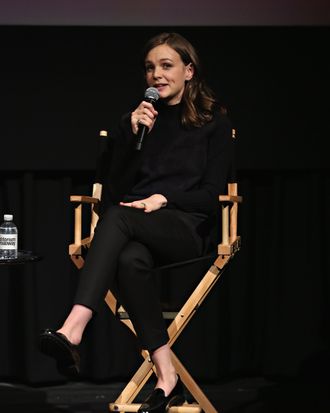
Carey Mulligan has transformed into a self-professed women’s history “geek.” Why? Maybe the intensive research involved in playing working-class laundress turned activist Maud Watts for Suffragette was cause enough, or maybe it was because much of the historical drama itself revolves around the fight for equal pay. Whatever the reason, Mulligan’s role has placed her squarely (if not conveniently) in Hollywood’s wage-gap conversation.
During an afternoon tea hosted by Peggy Siegal at Plaza Athénée, Mulligan told Vulture on Tuesday that the chatter around pay inequality between male and female actors is necessary and not, as some Brits might say, “vulgar.” “It’s proven now, as opposed to just being a theory. We know that women are paid less,” Mulligan said. “Our producer on the film talks about when she applied to be a dishwasher at her local restaurant and it was advertised as 50 pence for men and 30 pence an hour for women, and that was only in the ’60s or ’70s.”
Although Mulligan has made her mark with independent films — which have a difficult time raising production coin, much less eight-figure paychecks — she said of her few studio films: “I’m sure my male counterparts were paid more than I was.” But the new mom (she gave birth to daughter Evelyn with husband Marcus Mumford in late September) also thought everyone should curb the navel-gazing and take a broader view: “It’s important that our conversation isn’t just about Hollywood. It shouldn’t be a self-serving thing; it should be used to have a wider conversation, because it’s the same in all industries,” she said. “If we’re going to talk about it, we should use it as a platform, as opposed to just try and fix it for ourselves.”
Her candor’s quite different from, say, fellow Brit Kate Winslet. Mulligan admitted, however, it might be a particularly British trait to avoid talking about money. “Less so now, but certainly in the past you’d never ask someone how much money they earned or how much something cost. It’s properly British,” she said. “But for the sake of equality, it’s probably time to get over that. And it’s not a crass thing anymore; it’s just a necessary thing.”

